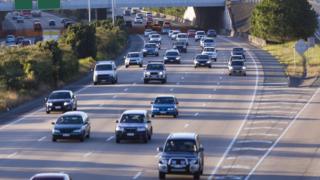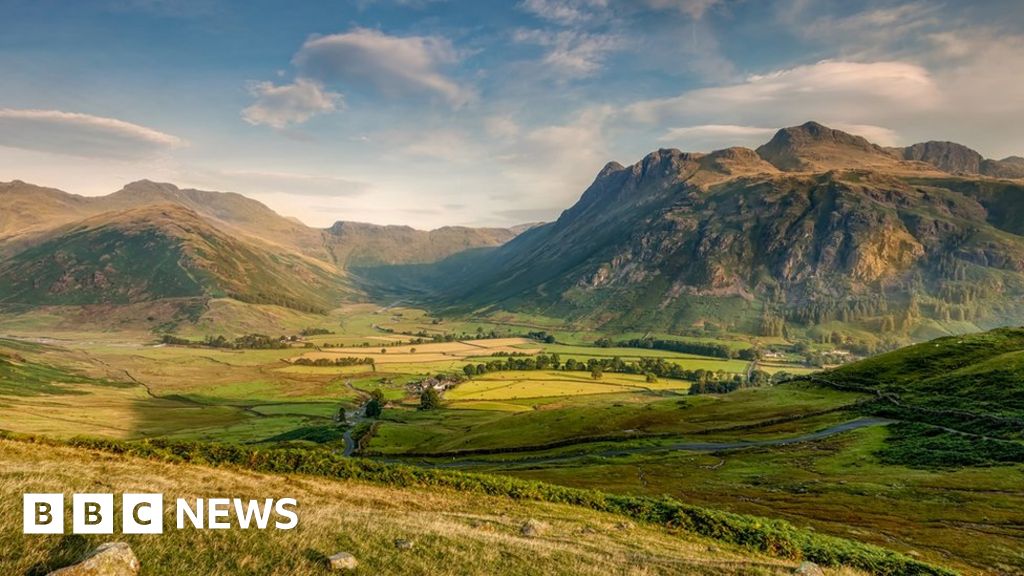 Image copyright
Getty Images
Image copyright
Getty Images
Car taxes should be increased to help fund the battle against climate change, government advisers say.
They say ministers should bring forward the date for ending sales of new conventional cars from 2035 to 2032.
The Committee on Climate Change (CCC) says the chancellor should also consider increasing the tax on gas for home heating.
It says the changes should be made as the UK looks to recover from the Covid-19 crisis by creating jobs.
The CCC also recommends the country aim to cut carbon emissions as part of a “green recovery“.
It says the government has a once-in-a-lifetime opportunity to change society for the better.
A government spokesperson said that tackling climate change should be at the heart of the UK's economic recovery.
But the committee insists that ministers must send the right economic messages to consumers.
The CCC chair, Lord Deben, says it makes sense to raises fuel prices when the cost of oil is low - and use the proceeds to subsidise low-emissions vehicles.
He said: “It seems perfectly clear that we should increase the tax on the very low oil prices we have at the moment. We need to make people who choose the right way to do so cheaper than those who choose the wrong way.”
Caution on gas heating taxes
The committee was more cautious about increasing the price of heating gas, and Lord Deben said the poor must be protected from high prices.
But it said the Treasury’s forthcoming review of climate policies must tackle the issue, as home heating must shift from gas towards low-carbon alternatives.
Another sector in urgent need of investment is the cooling of people’s homes, the report says.
As much of the UK swelters, the CCC warns that elderly and sick people are vulnerable to overheating, with hospitals, care homes, prisons, and flats in the south of England particularly at risk.
It projects that annual heat-related deaths could more than double by 2050 to 5,000 – that’s even if emissions targets are achieved.
It says refurbishing homes would improve lives and reduce emissions whilst also creating thousands of “green” jobs.
Cooling homes
Ventilation could be improved, sun-shading could be fixed to windows, and trees could be planted to cool the air and provide shade.
The report warns that the government will need to exceed its manifesto commitments on homes.
It also says the post-Covid-19 changes will require what’s known as a just transition’ for workers who’ll need to be re-trained from high-carbon to low-carbon jobs.
The report warns ministers against protecting jobs in polluting industries because that will lock in higher emissions in the long term.
It identifies key policy areas:
Getting around: It must be easier for people to walk and cycle. Better broadband is needed for home working. The government's ambition to reduce the number of car journeys needs policies. Trees: Planting projects and peatland restoration generate skilled employment as well as benefiting the climate, biodiversity, air quality, and flood prevention. Energy: Networks must be strengthened to support electrification of transport and heating. New infrastructure is needed for hydrogen, and carbon capture and storage. Innovation: Major investment is needed in research and development to give the UK a competitive advantage in clean industries.Systemic risks
Baroness Brown of Cambridge, chair of the CCC’s adaptation committee, said: “Covid-19 has shown that planning for systemic risks is unavoidable.
“We have warned repeatedly that the UK is poorly prepared for the very serious impacts of climate change, including flooding, overheating and water shortages. Now is the moment to get our house in order.”
A Government spokesperson said: "We agree that tackling climate change should be at the heart of our economic recovery.
"We were the first major economy to commit to achieving net zero emissions by 2050.
"We believe that the actions we need to achieve that target can help to deliver a stronger, cleaner, more sustainable and more resilient economy after this pandemic."
The CCC has been one of many organisations urging a green recovery. Some of them think help should be refused to struggling high-carbon industries such as aviation unless “green strings” are attached.
Among the voices is the employers’ organisation, the CBI, which said: “The need to act urgently on climate change will remain just as important as before the outbreak of coronavirus.”
A report from the green think-tank ECIU said investing in low-carbon jobs can help to ”level up” the UK to benefit the so-called “Red Wall“ constituencies that proved pivotal in the 2019 General Election.
And an overwhelming majority (79%) of Climate Assembly UK members – from many different backgrounds - said the government should support changes which help meet the UK’s net zero emissions target.
PM speech expected soon
The prime minister has said he wants to invest in a greener UK and he’s expected to to offer some policy details in coming weeks.
Benny Peiser, from the libertarian group the Global Warming Policy Forum, doubts that he’ll fully follow the committee’s advice.
He told BBC News: “Any policy that prioritises climate change policy over a rapid economic recovery would be suicidal for both the UK economy and the government. While Boris may talk the talk, he is unlikely to walk the walk.”
The committee is also criticised – from the opposite direction - by the authors of a report in the journal Climate Policy.
Researchers concluded that planned UK emissions cuts are less than half as rigorous as needed for the country to contribute fairly towards restricting global climate heating to less than 2C.
Co-author Prof Kevin Anderson told me: “The trouble is that the committee isn’t looking at what needs to be done – it’s looking at what it can say without being politically ignored. That’s very different.”
Lord Deben replied: “That is absolutely untrue”.
Follow Roger on Twitter.

 5 years ago
1031
5 years ago
1031 

